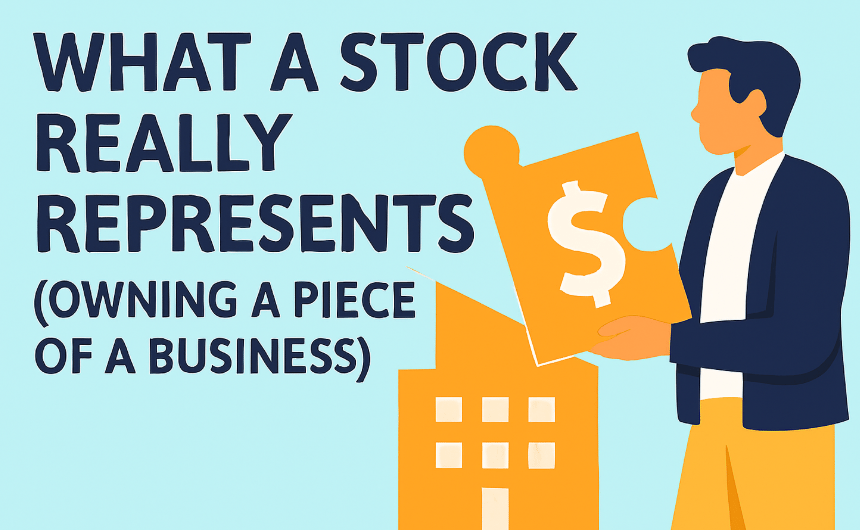- Live Life Grow Wealth
- Posts
- Series 2 Day 1: What a Stock Really Represents (Owning a Piece of a Business)
Series 2 Day 1: What a Stock Really Represents (Owning a Piece of a Business)

Today’s Headline
💸 Series 2: Stock Market Basics
Day 1: What a Stock Really Represents (Owning a Piece of a Business)
When I first started learning about investing, I used to think of stocks as just numbers on a screen. They went up and down, and people tried to make money by buying low and selling high. Simple, right?
But then I learned something that completely changed the way I saw investing — a stock isn’t just a number. It’s ownership. When you buy a stock, you’re not just trading paper or pixels. You’re buying a real piece of a real business.
That single idea transformed the way I invest.
Want to see how smart ad placements can turn into serious revenue? Roku’s holiday guide walks you through how to use CTV advertising with the Ads Manager to reach massive audiences during the most profitable season of the year. If you're thinking beyond stocks and scaling your income streams, this is one resource you don’t want to skip.
Find your customers on Roku this Black Friday
As with any digital ad campaign, the important thing is to reach streaming audiences who will convert. To that end, Roku’s self-service Ads Manager stands ready with powerful segmentation and targeting options. After all, you know your customers, and we know our streaming audience.
Worried it’s too late to spin up new Black Friday creative? With Roku Ads Manager, you can easily import and augment existing creative assets from your social channels. We also have AI-assisted upscaling, so every ad is primed for CTV.
Once you’ve done this, then you can easily set up A/B tests to flight different creative variants and Black Friday offers. If you’re a Shopify brand, you can even run shoppable ads directly on-screen so viewers can purchase with just a click of their Roku remote.
Bonus: we’re gifting you $5K in ad credits when you spend your first $5K on Roku Ads Manager. Just sign up and use code GET5K. Terms apply.
💡 What Does It Mean to “Own” a Stock?
Let’s imagine your favorite company — maybe it’s Apple, Nike, or Starbucks. Every time you buy one share of that company’s stock, you literally own a small piece of that company. You’re now part-owner.
It’s just like buying a small slice of a pizza. You don’t own the whole pizza, but you do own a piece of it. And if the pizza shop becomes more popular and sells more slices, your piece becomes more valuable.
That’s exactly how it works with stocks. When a company grows — makes more profits, launches new products, and attracts more customers — your shares increase in value. You benefit because you’re part of the business.
🏢 You’re a Business Partner (Even If You Don’t Work There)
When I finally realized this, it felt empowering. I wasn’t just a trader chasing prices; I was a business partner with some of the world’s most successful companies.
Owning shares means you share in their success. If the company makes profits, part of those profits may come to you as dividends. And if the business grows over time, your shares can become worth more.
It’s like being part of a team where you don’t need to show up for meetings, but you still benefit when the team wins.
📊 Why Businesses Issue Stocks
Companies issue stocks for one main reason — to raise money to grow.
Let’s say a company wants to expand, build new stores, or develop new technology. Instead of borrowing money from banks, they sell part of the company to investors like you and me.
We give them capital (money), and in return, we receive ownership (shares).
When the company does well, both sides win:
The company gets funds to grow.
We, as shareholders, get to share in the profits.
That’s how the stock market connects people who have money with businesses that have ideas. It’s a partnership built on growth and trust.
💬 The Stock Market Is a Marketplace for Ownership
Think of the stock market like a giant supermarket. But instead of fruits, bread, and milk, the shelves are filled with pieces of companies.
When you go “shopping” in the market, you’re choosing which businesses you want to own. Do you believe in Tesla’s future? Do you think Disney will keep entertaining the world for decades? Do you trust Microsoft’s innovation?
Every share you buy is a vote of confidence. You’re saying, “I believe in this company’s future.”
That’s what separates an investor from a gambler — an investor knows what they own and why they own it.
📈 How the Value of a Stock Grows
Stock prices go up and down every day, but what truly matters is how the company performs over time.
If the business keeps making more profits, expanding its reach, and becoming stronger, the stock price will eventually follow.
There are two main ways you can make money as a shareholder:
Capital appreciation – When the stock price increases because the company becomes more valuable.
Dividends – When the company shares part of its profit with you regularly.
Over time, strong companies tend to grow both their profits and their share prices. That’s why it’s important to focus on the business, not just the price.
🧠 Think Like an Owner, Not a Trader
One of the best pieces of advice I ever got was from Warren Buffett. He said, “When you buy a stock, think of it as buying the whole business.”
That means you shouldn’t care about short-term price movements. Instead, care about how the business is performing.
When I invest, I ask myself:
Do I understand what this company does?
Will people still need its products or services 10 years from now?
Is the company making profits and growing steadily?
If the answers are yes, then I’m happy to own a piece of it — and I’m not worried about daily price swings.
💬 Why Understanding Ownership Matters
When you see a stock as ownership, you become more patient and logical. You’re less likely to panic when prices drop because you know that short-term noise doesn’t change the long-term value of a good business.
For example, if you owned a restaurant and the property value temporarily dropped, would you sell your whole restaurant overnight? Of course not. You’d keep serving customers, improving your food, and waiting for business to grow again.
That’s how you should treat your stocks — as businesses you believe in, not lottery tickets you trade impulsively.
⚙️ The Mindset Shift That Changes Everything
Once you start seeing yourself as a business owner, everything changes.
You stop chasing “hot tips” and start studying real companies.
You stop worrying about short-term news and start focusing on long-term results.
You stop trading emotionally and start investing with purpose.
You begin to realize that the stock market is not your enemy — it’s your partner. It gives you access to opportunities that only the wealthy had in the past.
You can own part of Apple, Google, or Coca-Cola without being a billionaire. That’s the beauty of modern investing.
Become an email marketing GURU!
If you want to attend the world's largest virtual email marketing event, now is the time to reserve your spot.
The GURU Conference will feature big names like Nicole Kidman, Amy Porterfield, Lance Bass (for real!), and 40+ More!
It’s two epic days packed with everything email marketing. 100% Free. 100% virtual. Join us Nov 6–7th.
Spots are limited!
💰 The Bigger Picture: Wealth Comes from Ownership
If you look at the world’s wealthiest people, you’ll notice one thing they all have in common — they own assets, not just cash.
They own businesses, stocks, and real estate. They let those assets work for them while they sleep.
Every share you buy moves you one step closer to that same path. Even small amounts count because they represent real ownership in real companies. Over time, that ownership can turn into financial freedom.
So the next time you look at your investment account, don’t see random numbers. See businesses — businesses you believe in and want to grow with.
🧭 Takeaway and Advice
Investing is not about timing the market. It’s about owning great companies and giving them time to grow.
Remember these key points:
A stock is a piece of a real business.
As an investor, you are a part-owner.
Focus on understanding what you own.
Be patient — good businesses need time to grow.
Let your money work through ownership, not guesswork.
When you invest with this mindset, you move from being a speculator to a true investor.
Final Takeaways
Owning stocks is like planting seeds. Each share you buy has the potential to grow into something powerful — a company that employs people, innovates, and creates value.
You might not see results overnight, but just like trees, businesses grow slowly and steadily. The key is to stay invested and let time do the heavy lifting.
Your goal isn’t to own every company in the world — just the right ones that you understand and believe in.
🚀 Call to Action
Here’s my challenge for you today:
Take a look at your favorite brands — the ones you use or trust daily. It could be your smartphone company, your favorite coffee shop, or the streaming service you love.
Now, imagine owning a part of it.
Do a little research about how that company makes money and grows. You’ll start to see investing not as gambling, but as becoming a partner in success.
Start thinking like an owner — because that’s what real investors do.
[Live Life Grow Wealth]
🎓 Free Masterclasses to Unlock Your Investment Potential
Take your money skills to the next level with expert-led workshops designed to help you grow smarter and faster.

Recommendations Section
|
|
|
|
DISCLAIMER
I make no representations, warranties, or guarantees, whether expressed or implied, that the content provided is accurate, complete, or up-to-date. Past performance is not indicative nor a guarantee of future returns.
I am an individual content creator and not regulated or licensed by the Monetary Authority of Singapore (MAS) as I do not provide investment services.
All forms of investments carry risks, including the risk of losing your entire invested amount. Such activities may not be suitable for everyone. You are strongly encouraged to seek advice from a professional financial advisor if you have any doubts or concerns.









